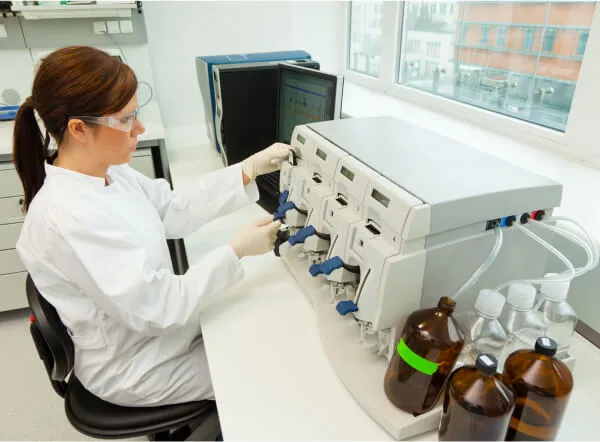Biochemistry

In the field of biochemistry, you can work towards a diverse array of goals, including developing lifesaving drugs or creating new energy-efficient fuels. Read on to learn more about academic programs, career prospects and earnings for this field.
<h2 id="section---IsBiochemistryForMe">Is Biochemistry for Me?</h2>
<h3 id="section---CareerOverview">Career Overview</h3>
<p>Biochemistry is the study of the chemical constitution of living organisms. A <a href="https://learn.org/articles/Biochemistry_5_Steps_to_Becoming_a_Biochemist_in_5_Steps.html">biochemist</a> is a biological scientist who analyzes the intricate chemical reactions related to metabolism, reproduction and growth. As a biochemist, you'll be involved in research at the cellular level and may help develop new ways to detect and cure disease, increase crop yields and create valuable new products, such as biofuels.
</p>
<h3 id="section---EmploymentOptions">Employment Options</h3>
<p>With a bachelor's <a href="https://learn.org/articles/Biochemistry_Degree_and_Training_Programs_Answers_to_Your_Questions.html">degree in biochemistry</a>, you may work for a government agency, such as the U.S. Food and Drug Administration, doing basic research and analyzing food and drug samples. You may also work for a biotechnology company in quality control or clinical research.
</p>
<p>A master's degree will prepare you for some positions in applied research, product development and management. For independent research and development positions, administrative positions and university faculty positions, a Doctor of Philosophy (Ph.D.) will generally be required. Graduates of biochemistry programs can work in pharmaceutical manufacturing, medical research, forensic science and several other fields. Many students also use an undergraduate degree in biochemistry as a stepping stone to medical or veterinary school.
</p>
<h3 id="section---JobOutlookAndSalaryStatistics">Job Outlook and Salary Statistics</h3>
<p>The U.S. Bureau of Labor Statistics (BLS) reported that as of May 2013, biochemists and biophysicists had a median annual wage of $84,320 (<i>www.bls.gov</i>). The BLS also stated that there were over 29,000 professionals working in these fields in 2012, and employment opportunities are projected to increase by 19% between 2012 and 2022.
</p>
<h2 id="section---HowCanIWorkInBiochemistry">How Can I Work in Biochemistry?</h2>
<h3 id="section---EducationRequirements">Education Requirements</h3>
<p>To work in biochemistry, you'll typically need at least a bachelor's degree in biochemistry or <a href="https://learn.org/articles/Molecular_Biology_Degree_and_Certificate_Programs_FAQs.html">molecular biology</a>. In a bachelor's program, you can expect to take advanced math, as well as biology, <a href="https://learn.org/articles/Bachelors_Degrees_in_Physics_Program_FAQs.html">physics</a> and chemistry classes. If applying to a master's degree program, then a bachelor's degree in physical, chemical, biological or <a href="https://learn.org/articles/Agricultural_Science_Degree_Programs_Your_Questions_Answered.html">agricultural science</a> may also be an advantage.
</p>
<h3 id="section---GraduateStudies">Graduate Studies</h3>
<p>You'll usually need to have completed classes in calculus, physics, organic chemistry, physical chemistry, biology and genetics to apply to most <a href="https://learn.org/articles/Biochemistry_Courses_and_Schools_Frequently_Asked_Questions.html">biochemistry graduate programs</a>. If you're interested in distance education, due to a busy work schedule or living too far from a prospective university, you may be able to find <a href="https://learn.org/articles/Online_Biochemistry_Courses_and_Schools_Answers_to_Your_Questions.html">online biochemistry</a> opportunities.
</p>
<p>To <a href="https://learn.org/articles/Biochemist_Career_Profile_Occupational_Outlook_and_Education_Prerequisites.html">become a biochemist</a>, you'll typically need to earn a Ph.D. This can take about 4-5 years to complete and requires original research and a dissertation, as well as courses in physical biochemistry, enzymology, molecular biology and biochemical regulation.</p>


.svg)